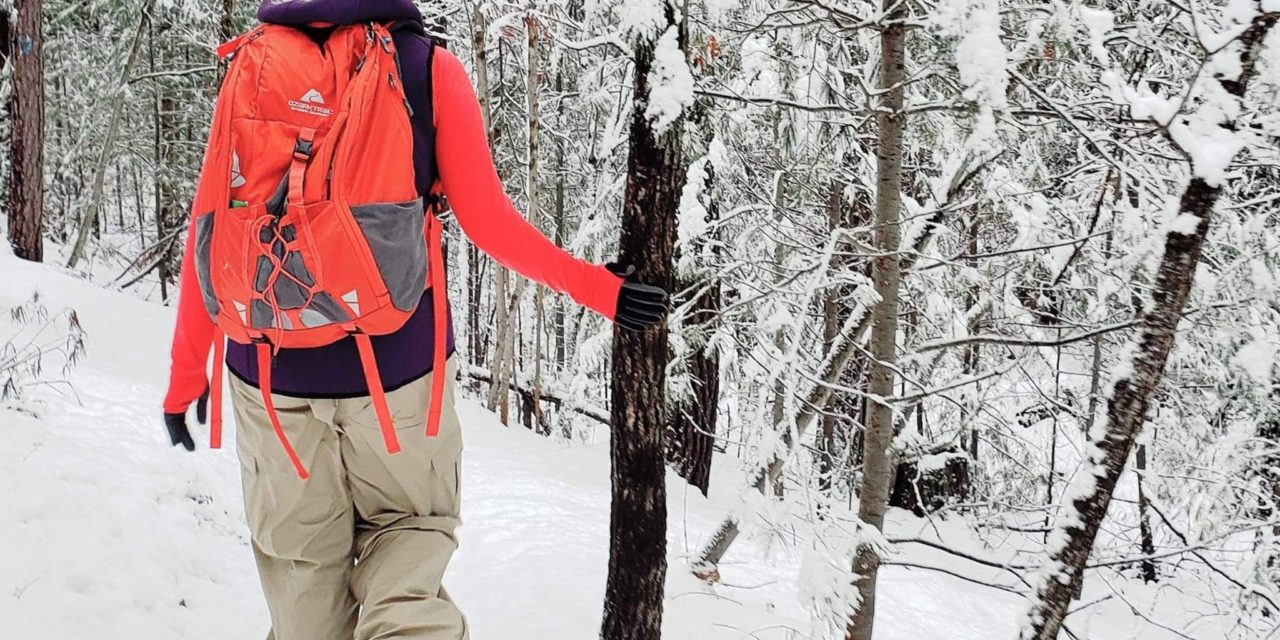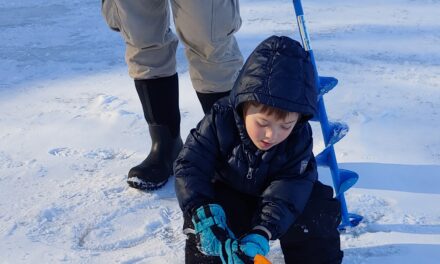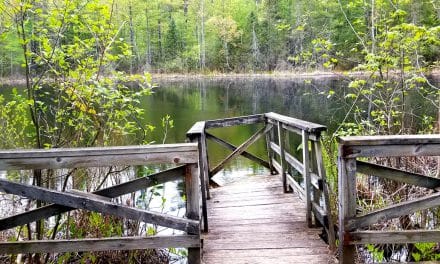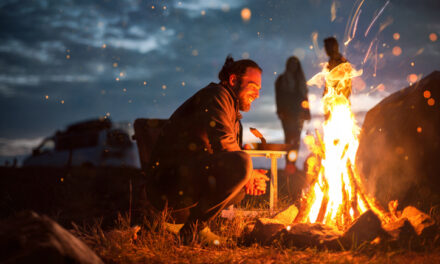Excited to throw 2020 behind me & crush all the goals in 2021, I signed up for the 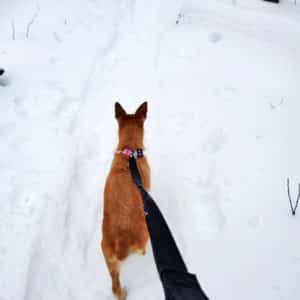
North Country Trail Hike 100 Challenge. Ambitious, as I’ve only hiked a handful of times in my life, but why not make 2021 my year?
I embarked on my first hike in the first few days of January, shortly after a pretty heavy snowfall. I brought my old pup, who has more energy than me most days. We made it about 2 miles, and, honestly, it was pretty tough.
Aiming to improve & maximize my success, I reached out to 4 expert hikers to get some insight on hiking in the winter.
With nearly 30 years of combined hiking experience between them, Kelly, Kerry, Denise & Colleen had some great advice for me.
Q: When did you start hiking in the winter?
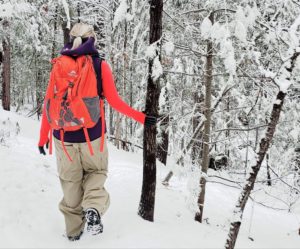
Kelly: I asked for snowshoes and hiking poles for Christmas in 2004, and I’ve been HOOKED EVER SINCE! (You don’t need these to hike in the winter, only when weather permits).
Kerry: My father-in-law gave my whole family snow-shoes for Christmas 6 years ago. Since then we’ve been actively hiking and snow-shoeing trails in Newaygo County in the winter time.
Denise: Started winter hiking this year.
Colleen: I had never hiked in any other season prior to hiking in the winter. I was always on the water during the summer and in the fall I would stay away from the trails because of the hunters. So winter hiking is my first love.
In your opinion, what are the ideal conditions for winter hiking?

Kelly: I enjoy winter hiking day or night all winter- as long as the wind is not blustering.
Kerry: If you are snow-shoeing a lot of fresh, fluffy snow. Ideally, when hiking or snow-shoeing wet/heavy snow will be a lot harder and quite strenuous on the body. If you are hiking, I would suggest a light snow fall that will allow traction on a well beaten path.
Denise: Ideal conditions for me are about 20-30 degrees, with little to no wind. If the suns out it’s even better.
Colleen: Anytime there is no ice. I love hiking in the cold and crunchy snow. The best part of hiking in the winter is the beauty of the snow, the quiet of just being in the outdoors in the snow is very different than spring, summer or fall. The woods have a different feel, the water along the river sounds different than any other time of year.
For a beginner, what are ‘must have’ winter hiking supplies?
Kelly: A good waterproof hiking boot, appropriate socks, a simple backpack for essentials, proper layers of clothing, poles, first aid kit and a map of the trail! Once you learn your footing, you may not use the poles as much. They really help with elevation hikes or icy trails
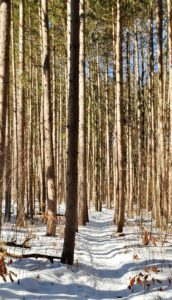
Kerry: You have to have a comfortable pack. I would suggest one that clips one around the waist and around the chest. Once you start moving, your core temperature will warm up and you might want to shed some clothing. This will allow you to dress in layers and store clothes in your pack. Furthermore, after your hike you are going to want to put on dry clothes. I would suggest to fill your pack with the following necessities: a map, compass, small flashlight, adhesive body & hand warmers, extra socks, gloves, hat, food, and plenty of water. Comfortable, waterproof hiking boots that provide great support for the ankle are a must have too! Depending on the weather conditions and your own stability issues, a good set of poles might be a good idea. Lastly, Chapstick because my lips always get dry in the cold air/wind, and plenty of tissues or a handkerchief because your nose will definitely react to the cold, fresh air.
Denise: Good winter hiking boots, hiking poles, light weight snow pants, good gloves, good to layer your clothes.
Colleen: Ski pants or a water proof pants, water proof boots, GOOD wool socks, invest in those. Layers on the top half you will sweat and getting cold when you stop to take in the beauty is no fun.
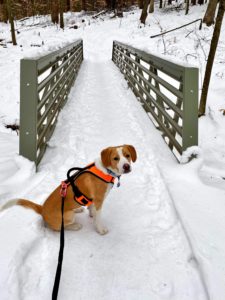
What gear do you never leave home without for a winter hike?
Kelly: Water, knife, pepper spray, lighter, tinder for a fire, extra socks, first aid kit, solar phone charger, phone, map
Kerry: My pack, Chapstick, tissues or handkerchief, phone, compass, pepper spray, gloves, hat, extra socks, pants and sweatshirt, hand & body warmers, food, and plenty of water. I also have a flashlight, lighter, first aid kit, extra bandage tape and an emergency whistle that never leaves my pack.
Denise: Water is a must, a snack, gloves, boots, hat, cell phone.
Colleen: thin gloves, hiking pole(s), compass, water bottle, snacks and a great friend and sometimes my camera.
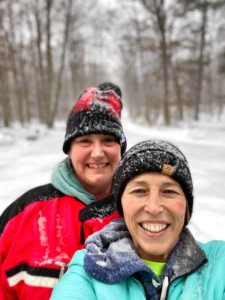
Where is your favorite Newaygo County winter hiking locale?
Kelly: I love the stretch from Pierce Dr. to 11 Mile. (5 miles) You cross four bridges and see a lot of different terrain along the trail system and water
Kerry: The North Country Trail from Croton west towards Basswood, the North Country Trail anywhere from 40th St. north, and around the Loda Lake area.
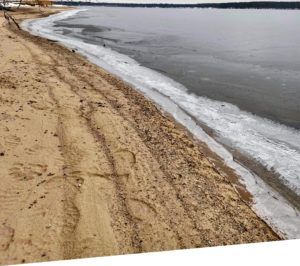
Denise: Anywhere in the woods or by water. The Dragon trail starting at Hardy Dam, Consumers Energy trail by Hardy Dam
Colleen: Hardy pond and Coolbough Nature Preserve. Looking forward to trying the Dragon out.
What about safety… Do you hike alone? Bring Pepper Spray?
Kelly: It is always better to use the Buddy system and hike in numbers, but if you enjoy solo hiking as I do sometimes always let someone know where you are going, time, and check in along the way if you can. I bring a knife and Pepper Spray on every hike. I don’t listen to my headphones! Your in NATURE, enjoy the sound around you…and listen for the bears 😊
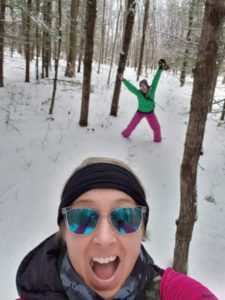
Kerry: My husband will not let me hike alone. I carry pepper spray, my phone, and at least one hiking partner. In addition, I always let someone know what section I’ll be on, along with start and end times.
Denise: I do hike alone but with my dog
Colleen: I have done short hikes alone but nothing more than an hour. I prefer to be out with someone, safety in numbers incase of an injury. Not that I have ever had anything more than a broken toenail. Be on the look out for hidden tree roots or rocks.
Any other advice for newbies?
Kelly: Do your homework and read about the trail stretch you want to hike. Ask others who have done that section. Bring someone who has done that section before. Don’t depend on your cellphone to use as your guide. Bring a map to help you on the hike. Always bring extra water!

Kerry: I would suggest taking a small section and hiking when the weather is pleasant. I would not start off on a long hike, too cold, or wet/heavy snow.
Denise: Start slow -don’t try to go out and hike a long way right at the start…work your way up and learn as you go.
Colleen: Tell someone where you are going. Even if you are out with someone else make sure someone knows where you are going and when you expect to return.
Only 96 miles to go, I wonder how many I can tackle with snow on the ground?

